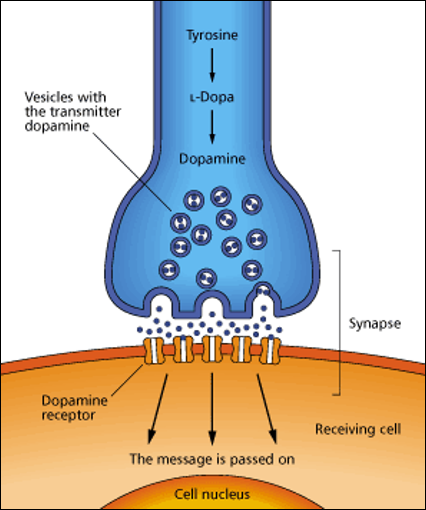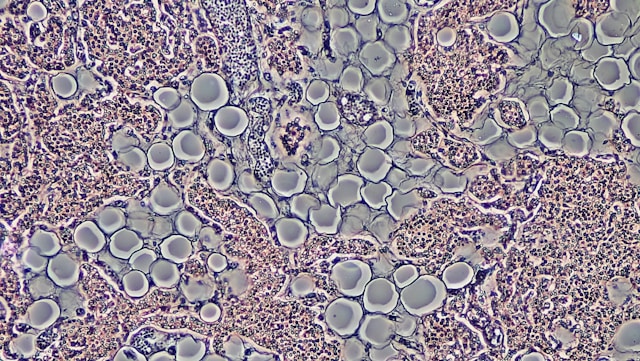by Richard Weil, M.Ed., CDE
Founder and Director
Transformation Weight Control
There’s so much talk about neurotransmitters when it comes to appetite regulation that I thought I would explain in some detail what neurotransmitters are and why they are so important. Take a look at the figures below, a simple and very detailed one, to help you follow along. I’ll limit my discussion to dopamine and serotonin, both important neurotransmitters for appetite regulation. All neurotransmitters work the same way. Have a look at this first image to follow along.

Dopamine
The neurotransmitter dopamine, produced in the ventral tegmental area (VTA) of the brain, is stimulated by the sight or even just the thought of food in your mind’s eye, as well as the smell, taste, or talking about food. Once the VTA produces and secretes dopamine into the brain in response to the desirable stimuli, dopamine…
travels down a neuron, which are specialized cells in the brain that transmit nerve impulses, then…
it passes into a synapse, the space between neurons, and then…
once in the synapse it activates the target receptor…
which in turn passes a message on to other cells for the desired effect that the receptor is programmed for, and then…
once the neurotransmitter activates the receptor, which will take just milliseconds to seconds, it returns to the neuron from which it came, in a process called reuptake.
In the case of dopamine, it causes pleasure from substances such as alcohol, drugs and food, and activities such as music, art, or sex; in our case, we’re talking about pleasure from food.
Inhibiting Reuptake
The longer a neurotransmitter stays in the synapse (beyond seconds), the more of the desired effect it will have. For example, the anti-depressant Prozac is a serotonin reuptake inhibitor. Serotonin alleviates symptoms of depression. When you take the SSRI Prozac, serotonin remains in the synapse longer before reuptake, thus activating the receptor which is programmed to pass on a message to alleviate you symptoms of depression. Serotonin is also involved in controlling hunger and satiety. When serotonin levels are high, it generally leads to feelings of fullness (satiety), while lower serotonin levels can lead to increased appetite and cravings, especially for carbohydrate-rich foods. There is a well-established link between low serotonin levels and cravings for carbohydrate-heavy foods like sweets, pasta, or bread.
The weight loss medication Contrave, is a combination of Wellbutrin, a dopamine reuptake inhibitor (DRI), and naltrexone, a drug used for treatment of alcohol addiction, but has been shown to have some effect on food intake by blocking certain receptors of the reward pathway in the brain (see my post about the reward pathway). Cocaine is also a DRI, that’s part of why it’s so addictive; it contributes to intense feelings of pleasure. You could see why a DRI would be desirable. By inhibiting dopamine reuptake and keeping it in the synapse longer, you will experience more pleasure from food, art, music, sex, and so much more.
Addiction
When receptors are overused by substance abuse or overconsumption for long periods of time, they become oversaturated and damaged so that their performance is decreased (i.e., they burn out). This burn out is known as receptor down-regulation. When receptors are down-regulated, you need more of the neurotransmitter for it to work, and so it takes more stimulus for the brain to increase production and secretion of the neurotransmitter of interest. With dopamine and food, this translates to over consumption of food to get more dopamine so that it can activate the damaged receptor and give you the pleasure you desire, to get your “fix”. When you over consume food, you gain weight.
At TWC
At TWC, we explain and discuss all these mechanisms in detail to provide you with a greater understanding of the science. We don’t teach it to label you as an addict, but rather to empower you to feel able to take control of appetite regulation. I’ve measured food addiction in our groups using special questionnaires designed for the purpose, and it turns out that we do a good job of reducing the symptoms of addiction to food in our participants.
And finally, we teach the science, even in its most simplistic, understandable way, for the most important reason of all, one that I have repeated many times. We want you to understand that NONE OF THIS IS YOUR FAULT. Your struggles with weight, and food addiction, have nothing to do with a lack of self-discipline, lack of willpower, a moral failing, nor a character flaw. This is a biological problem. No one ever decided to intentionally have a problem with eating, their weight, nor food addiction. No one. Don’t let anyone shame you and tell you all you have to do is eat less and exercise more.
Join us at TWC. We’ll support you and show you the way. We’re committed to it and we’re rooting for you.
For more reading, see my blog, “How to Manage Food Addiction”.
© Richard Weil, M.Ed., CDE, 2024 All Rights Reserved











